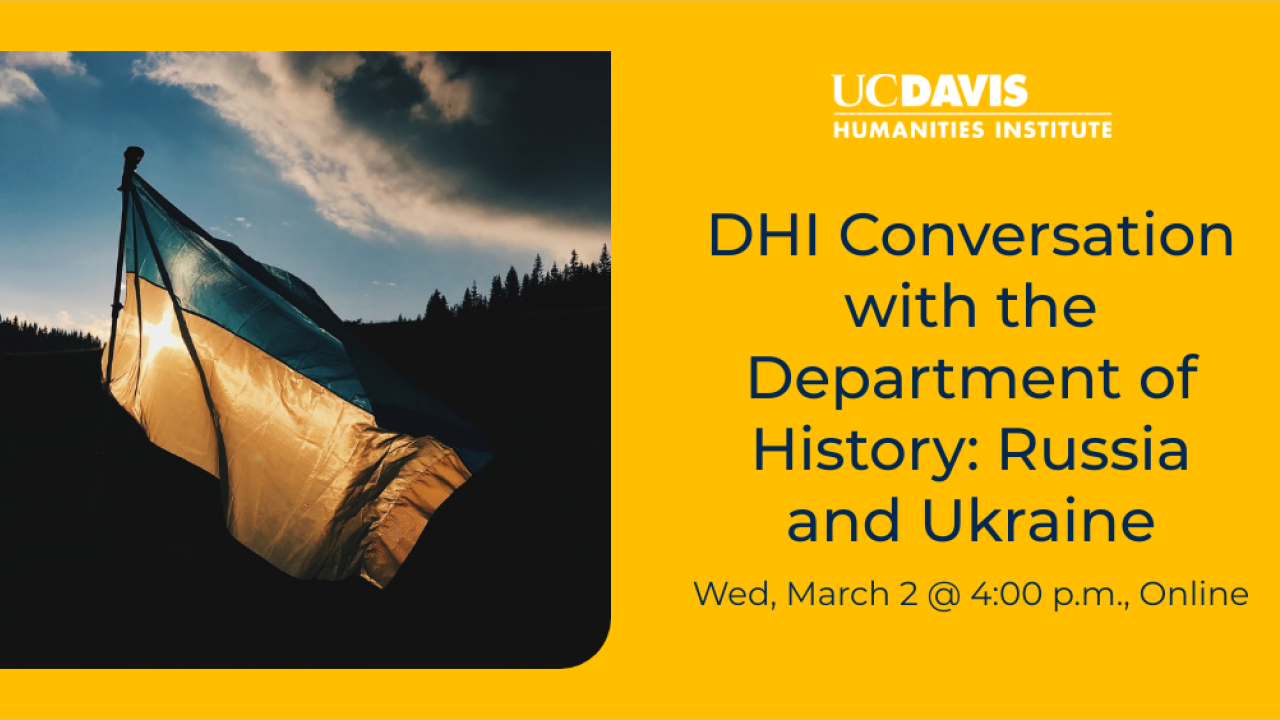
Understanding Russia’s Invasion of Ukraine
On Wednesday, March 7, the DHI partnered with the Department of History for an urgent conversation about Russia’s invasion of Ukraine. The event was co-sponsored by the History Project at UC Davis (UCDHP), the California History Social Science Project (CHSSP), the History Club, the Department of German, and the Russian Program. Moderated by Jaimey Fisher, Director of the DHI and Professor of German, the panel gathered five UCD experts to discuss the historical and current political contexts contributing to this multifaceted war.
Josephine Andrews, Associate Professor, Department of Political Science, began the conversation with a presentation on the Russian and Ukrainian politics of the recent past that have informed this invasion. Since the 2000’s Russia has been on an economic upswing due to Putin’s renationalization of the country’s energy industry and thus believes that it is in a position to oppose NATO expansion and Western influence. Ukraine has been divided between European and Russian influence for some time, but, with the annexation of Crimea, has recently elected more pro-EU leaders. At the same time, legal changes in Russia have solidified and centralized power in Putin’s office. Putin’s invasion of Ukraine reflects his belief in the weakness of the West and his desire to restore Russia’s importance on the global stage.
David Biale, Distinguished Professor, Department of History, traced the rise and fall of democracy in Europe post-Hitler in order to contemplate the impact of the re-emergence of a “Soviet Empire” under Putin. Drawing parallels between Hitler’s autocracy and Putin’s actions, Biale argued that WWII was merely a moment in the long battle between fascism and democracy and that the Russian invasion of Ukraine is now the greatest threat to democracy since Hitler. Based upon Western responses so far, Biale posits that this conflict is already global—this is already World War III—because Putin will read Western aid to Ukraine as interference and retaliate.
Ian Campbell, Associate Professor, Department of History, went over the 2013 Euromaidan protests in Ukraine and recent Russian aggression in Crimea and the Donbass. The Euromaidan were a series of protests in 2013 sparked by Ukraine’s then president Viktor Yanukovych’s decision to renege on an association agreement with the European Union. Instead, Yanukovych pursued a Russian loan bailout, thus creating a financial crisis. Protests erupted and in 2014 serious violence by the Ukrainian state and right-wing factions of Euromaidan resulted in the removal of President Yanukovych. Campbell sees this moment as a vital context for Russia’s aggression in the Crimean Peninsula and the Donbass region of Eastern Ukraine, as it reflected a moment when a leader was ousted by popular protests, as well as the further drifting of Ukraine from Russian influence and the growing influence of the EU. Campbell went over the similarities between Crimea and the Donbass in regards to their ties to Russia and Russian culture. Russian propaganda and some missteps by the Ukrainian government allowed a Russian separatist movement to grow in the Donbass and Putin was able to portray the annexation of Crimea and the conflicts in the Donbass as a situation where ethnic Russians needed protection.
Anya Free, PhD candidate, Department of History, provided a brief overview of how the Russian propaganda machine works. She went over notable figures in Russian media and Putin’s efforts to kill independent media. Common Russian propaganda about Ukraine includes the idea that the Ukrainian state and ethnic Ukrainians have a Nazi-level hatred for ethnic Russians in the Donbass, that this invasion is actually a humanitarian aid mission, and that Nazi groups and the United States control the state and President Volodymyr Zelenskyy.
Jenny Kaminer, Associate Professor, Department of German & Russian, went over recent Russian crackdowns on protesters, particularly during the waves of protests in Moscow in 2017 and 2019. These protests had a huge youth presence and resulted in an aggressive backlash by the Russian state. Hundreds were arrested and possibly blacklisted while Putin simultaneously increased regulations for independent media, resulting in an atmosphere of fear and hopelessness. Kaminer’s recounting of these protests and their aftermath highlighted the bravery of the current Russian anti-war protesters.
To hear the full presentations, please view the recording of the event on the DHI Youtube page. The History Project has also shared this list of relevant resources.
